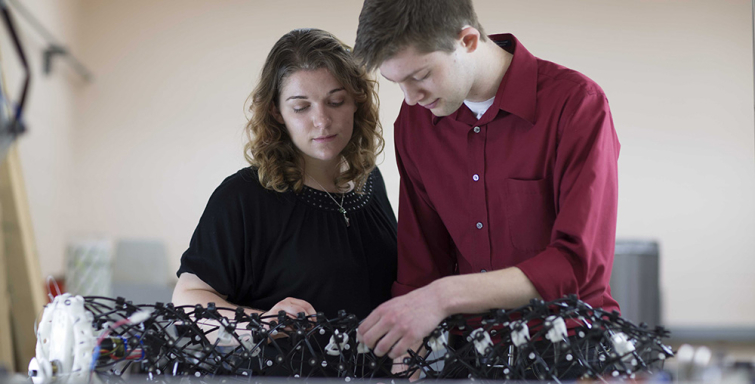BSE in Mechanical Engineering
Degree: Bachelor of Science in Engineering
Major: Mechanical Engineering
Mechanical engineers harness the power of machines to help us accomplish our tasks and goals faster, better, safer and more efficiently. We’ve designed and improved machines to better our lives—from the refrigerator that stores our lunches to the cars that get us where we’re going to the medical devices that keep us healthy.
If you’re looking to be an engineer who solves problems—who can weave together fundamental knowledge of not just math, physics and chemistry, but also fluid and thermal sciences, kinetics and dynamics in order to design real-world solutions and approach problem solving creatively, then a mechanical engineering degree could be right for you.
Since 1887, the Case School of Engineering has been educating leaders in problem-solving and design engineering who understand how to transmit power, energy and forces to make the world move. Our ABET-accredited program offers a Bachelor of Science in Engineering degree in mechanical engineering that will provide you with a strong foundation in core concepts that you’ll apply to solve a variety of problems related to machines, the environment, materials, fluids and heat. Your mechanical engineering education can take you to any number of industries, including robotics, advanced manufacturing, medical devices, energy and nanotechnology.
Our curriculum teaches you not just how something works, but why. You’ll gain a strong understanding of scientific principles that will allow you to be more creative in how you approach each problem and challenge. We produce well-rounded engineers who aren’t technicians, but scientists who invent the future.
Want to go further? We make it easy to double major in both mechanical engineering and aerospace engineering with the addition of just three more credits, when you align your technical electives appropriately. Or consider our BS/MS program, which lets you earn a bachelor’s and master’s degree in just five years. Plus, your acceptance into Case Western Reserve means the entire campus is at your disposal—we make it easy to explore all your interests across our schools, whether that means continuing your passion for music and dance with a minor or pursuing your entrepreneurial dreams with business and management courses. Even core requirements like composition classes can be met by interesting seminar topics like combating poverty and medieval robots.
At the Case School of Engineering, be prepared to get hands-on. The vast majority of our students participate in some kind of experiential learning activity, from co-ops and studying abroad to research. In fact, interested students can get involved in research beginning their first year on campus, with many students publishing in peer-reviewed journals before they graduate. Get involved in faculty research labs creating robots that crawl, fly and do the worm. Or see the impact of stress on bones and tissues in the Orthopedic Bioengineering Laboratory. Watch high-speed impacts in action with a gas gun capable of launching projectiles up to speeds of 1 kilometer per second. Join a student group that designs autonomous snow plows; builds and races award-winning Baja cars; or designs robots that dig for treasure. These award-winning student teams will not only line your trophy shelves, but teach you how to be a part of a team that solves complex problems.
Or pursue your own engineering designs at the 50,000-square-foot Sears think[box], a maker’s dream that provides not only all the designing and prototyping equipment you could imagine (from waterjet cutters to welding equipment, 3-D printers, laser cutters and more) but also all the business and entrepreneurship guidance needed to take your ideas past the finish line. Sears think[box] even includes the Reinberger Design Studio, where you have full access to a range of CAD/CAM software for design and manufacturing.
Plus, Cleveland is the place for engineers. Home to engineering Fortune 500 companies like Parker-Hannifin and Timken, as well as startups rolling out of the Health-Tech Corridor and the university’s Technology Transfer efforts, opportunities abound for internships, co-ops and employment.
Our students go on to work at places like Philips Healthcare, Tesla and Ford Motor Co., as well as advancing to earn their master’s or PhD from places like MIT, Caltech and more.
Learn more about the four-year curriculum:
Download EMAE_Course_Schedules_2023_Fall.pdf (184.37KB)
Download AE_ME_Programs_2022_Fall.pdf (150.83 KB)
Explore degree requirements, courses and more in the university's General Bulletin.

